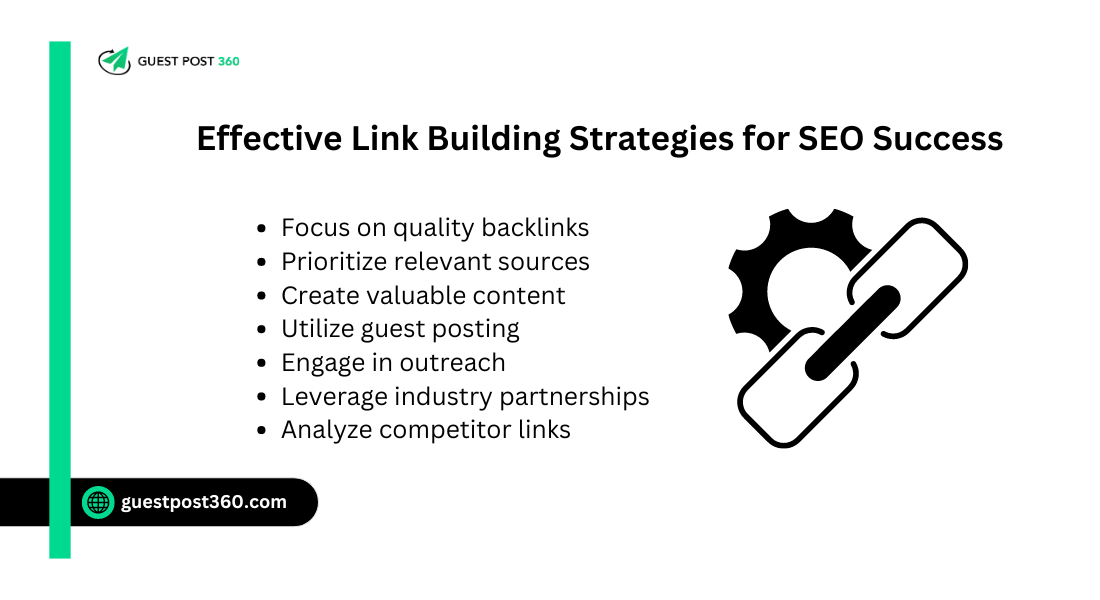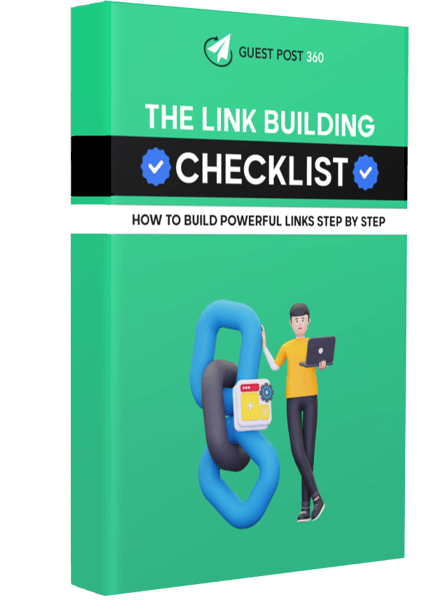Link building is one of the most effective ways to boost your website’s SEO performance. By acquiring high-quality backlinks from reputable sites, you can improve your search engine ranking and drive more traffic. An effective link building strategy requires a mix of content creation, outreach, and identifying relevant sites to link to your pages. It helps search engines view your site as a valuable resource, making link building essential for online success.
Effective link building also focuses on building relationships with other websites in your niche. By creating valuable content that others want to reference, you can naturally attract quality backlinks. These links not only enhance your site’s authority but also drive organic traffic, improving your chances of ranking higher on search engine results pages.
Table of Contents
ToggleWhat is link building in SEO?
Link building in SEO refers to the process of acquiring hyperlinks from other websites to your own. These links serve as a vote of confidence from one site to another, signaling to search engines that your content is valuable and worth ranking higher. By engaging in link building, you create a network of connections that enhance your site’s authority and visibility in search results. This process involves various strategies, including content creation, outreach, and collaboration with other websites to secure these essential backlinks.
In essence, link building is a fundamental aspect of SEO that focuses on establishing relationships with other web entities. Each link acts as a pathway, directing users from one site to another and improving your site’s credibility in the eyes of search engines. A well-executed link building strategy not only boosts your site’s rankings but also increases its chances of being discovered by a broader audience. Understanding what link building entails helps you implement effective practices to enhance your SEO efforts.
The effectiveness of link building lies in the quality and relevance of the links you obtain. Search engines evaluate these backlinks to determine the authority and trustworthiness of your site. High-quality links from reputable sources contribute significantly to your site’s SEO success, while low-quality or spammy links can have the opposite effect. Thus, focusing on building strong, credible links is crucial for achieving better search engine rankings.
Overall, link building in SEO is a strategic approach to improving your website’s online presence. It involves various techniques to secure backlinks that drive traffic and enhance your site’s authority. By mastering link building, you can elevate your SEO performance and achieve greater visibility in search engine results.
Why is link building important for SEO success?
Link building is crucial for SEO success because it directly influences your website’s authority and ranking on search engines. High-quality backlinks act as endorsements from other websites, signaling to search engines that your content is valuable and relevant. This endorsement helps improve your site’s position in search results, making it more likely for users to discover your content. Without an effective link building strategy, your website may struggle to achieve high rankings and visibility in competitive search landscapes.
The importance of link building lies in its ability to drive referral traffic to your site. When other reputable sites link to your content, it generates additional traffic from those external sources. This not only enhances your site’s visibility but also brings in potential visitors who might not have found your site otherwise. As a result, link building plays a significant role in expanding your audience and increasing your site’s overall traffic.
Furthermore, link building helps establish your website’s credibility and authority in your industry. Search engines view sites with a strong link profile as more trustworthy and relevant, which can lead to better rankings and increased user trust. Building a diverse range of high-quality backlinks is essential for demonstrating your site’s expertise and reliability in its field.
In summary, link building is a key component of SEO success due to its impact on rankings, traffic, and credibility. By implementing a robust link building strategy, you can enhance your site’s authority, attract more visitors, and achieve better visibility in search engine results.
How can you create an effective link building strategy?
Creating an effective link building strategy involves several key steps to ensure that you secure high-quality backlinks and enhance your site’s SEO performance. Start by identifying your target audience and understanding their interests and preferences. This information will help you create valuable content that other websites will want to link to. Additionally, conducting a thorough analysis of your competitors’ link profiles can provide insights into potential link building opportunities and strategies.
Next, focus on outreach efforts to build relationships with other webmasters, bloggers, and industry influencers. Personalized and thoughtful outreach emails can significantly increase your chances of securing backlinks. Offer something of value, such as guest posts, exclusive content, or collaboration opportunities, to encourage these individuals to link to your site. Building genuine relationships within your industry can also lead to more natural and effective link building.
Another essential aspect of an effective link building strategy is monitoring and evaluating your efforts. Use tools and analytics to track the performance of your backlinks and identify which strategies are yielding the best results. Regularly assess your link profile to ensure that you are acquiring high-quality links and avoiding any potential harmful links. Adjust your strategy based on these insights to continuously improve your link building efforts.
Finally, prioritize the quality of backlinks over quantity. Aim for links from reputable and relevant sites, as these will have a more significant impact on your SEO performance than numerous low-quality links. By focusing on high-quality link building and maintaining a strategic approach, you can achieve better search engine rankings and drive more traffic to your site.
What role do high-quality backlinks play in link building?
High-quality backlinks play a pivotal role in link building by significantly impacting your website’s search engine rankings and overall authority. Search engines consider high-quality backlinks as endorsements from reputable sources, which can enhance your site’s credibility and trustworthiness. When your site receives links from authoritative and relevant websites, it signals to search engines that your content is valuable and worthy of higher rankings in search results.
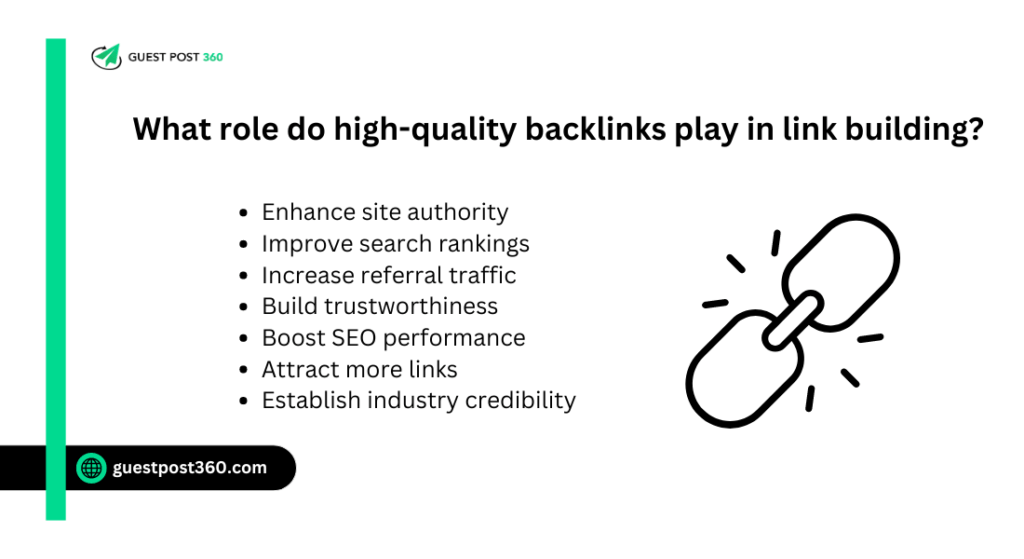

The value of high-quality backlinks lies in their ability to drive targeted traffic to your site. Links from well-regarded websites in your industry not only improve your site’s visibility but also attract visitors who are interested in your content. This targeted referral traffic can lead to higher engagement and conversion rates, further boosting your site’s performance and reputation.
Moreover, high-quality backlinks contribute to your site’s long-term SEO success. Unlike low-quality or spammy links that can negatively impact your site, reputable backlinks provide sustained benefits by enhancing your site’s authority and search engine rankings. By focusing on acquiring high-quality backlinks, you ensure that your link building efforts contribute positively to your site’s SEO and online presence.
In summary, high-quality backlinks are crucial for effective link building as they enhance your site’s authority, drive targeted traffic, and support long-term SEO success. Prioritizing these valuable links in your link building strategy can lead to improved rankings and a stronger online presence.
How does link building compare to content marketing?
Link building and content marketing are closely related but distinct strategies that both play essential roles in SEO. Link building focuses on acquiring backlinks from other websites to improve your site’s authority and search engine rankings. In contrast, content marketing revolves around creating valuable, relevant content to attract and engage your target audience. While link building is about gaining external validation through links, content marketing is about generating high-quality material that naturally attracts interest and encourages sharing.
Effective link building often relies on high-quality content as a foundation. When you produce valuable content, it becomes easier to secure backlinks from other websites that want to reference your work. In this sense, content marketing supports link building by providing the necessary resources and assets that other sites find worth linking to. Thus, while link building seeks endorsements from other sites, content marketing creates the material that drives those endorsements.
On the other hand, content marketing can benefit from link building by increasing the visibility of your content. By acquiring backlinks from reputable sources, you amplify the reach of your content and attract a larger audience. This synergy between link building and content marketing can lead to more significant SEO gains, as both strategies complement each other in driving traffic and enhancing your site’s authority.
In conclusion, link building and content marketing are interrelated strategies that contribute to SEO success. While link building focuses on acquiring external links, content marketing provides the valuable content that attracts those links. Integrating both approaches can create a more comprehensive SEO strategy, improving your site’s authority, traffic, and overall search engine performance.
What are common link building mistakes to avoid?
When implementing link building strategies, avoiding common mistakes is crucial for achieving optimal results. One significant mistake is focusing solely on the quantity of backlinks rather than their quality. Acquiring numerous low-quality or spammy links can harm your site’s credibility and result in penalties from search engines. Instead, prioritize securing high-quality backlinks from reputable and relevant sites to enhance your SEO efforts.
Another common mistake is neglecting the relevance of the sites you’re obtaining links from. Links from unrelated or irrelevant websites can have minimal impact on your SEO and may even harm your rankings. Ensure that your link building efforts target websites that are closely related to your industry or niche, as these links are more valuable and contribute positively to your site’s authority.
Additionally, some sites fall into the trap of using manipulative link building tactics, such as buying links or participating in link farms. These practices can lead to severe penalties and a loss of trust from search engines. Stick to ethical link building methods, such as creating high-quality content and engaging in genuine outreach, to maintain a positive SEO profile.
Finally, failing to monitor and manage your backlink profile can result in issues with link quality. Regularly review your backlinks to identify any harmful or low-quality links and take steps to disavow them if necessary. By actively managing your link profile and avoiding these common mistakes, you can ensure that your link building efforts contribute effectively to your SEO success.
How do you build natural backlinks for SEO growth?
Building natural backlinks is a crucial aspect of SEO growth and involves creating opportunities for other websites to link to your content organically. Start by producing high-quality, valuable content that addresses the needs and interests of your target audience. When your content is informative, engaging, and useful, it is more likely to attract links from other websites that find it valuable and worth referencing.
Another effective way to build natural backlinks is through outreach and relationship building. Engage with industry influencers, bloggers, and webmasters by offering to contribute guest posts or collaborate on content. By establishing genuine relationships within your niche, you increase the likelihood of earning natural backlinks from reputable sources that appreciate your contributions and expertise.
Additionally, leveraging content formats that encourage sharing and linking, such as infographics, research studies, and comprehensive guides, can help attract natural backlinks. These content types often provide valuable insights or visual appeal that other websites want to share with their audience, leading to organic link acquisition.
Finally, participate in industry-related forums, discussions, and online communities where you can share your expertise and provide valuable information. This engagement can result in natural backlinks as other community members reference your content or link to your site as a source of authority. By focusing on producing valuable content and building authentic relationships, you can effectively build natural backlinks that support your SEO growth.
Why is outreach important in link building?
Outreach is a critical component of link building because it directly facilitates the process of acquiring backlinks from other websites. By reaching out to webmasters, bloggers, and industry influencers, you establish connections and create opportunities for obtaining valuable links. Outreach allows you to present your content or website to individuals who might find it relevant and worth linking to, thereby enhancing your link building efforts and improving your SEO performance.
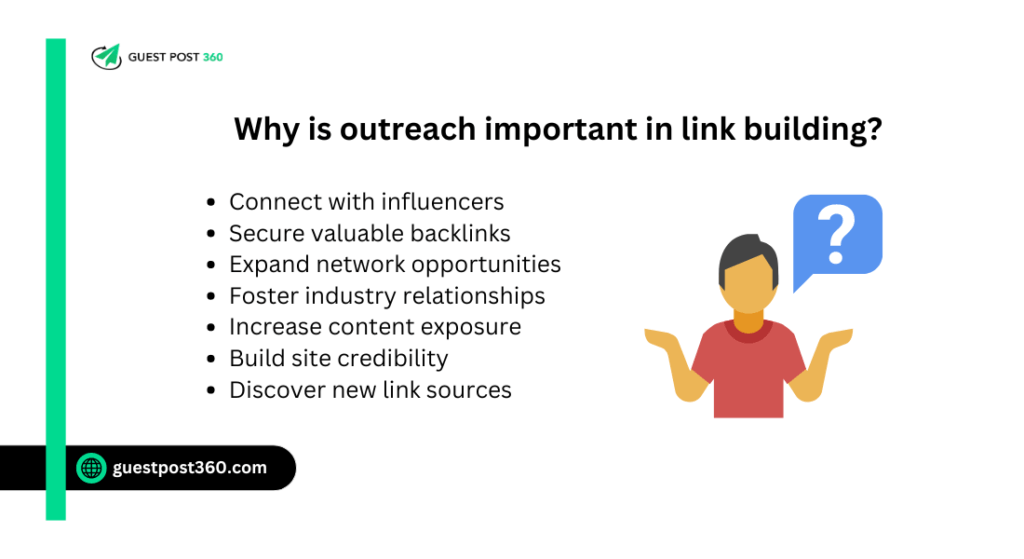

Effective outreach involves crafting personalized and compelling messages that clearly articulate the value of your content or link request. By demonstrating how your content aligns with the recipient’s audience or content needs, you increase the likelihood of securing a backlink. Outreach also helps build relationships with key industry players, which can lead to ongoing opportunities for collaboration and link acquisition.
Moreover, outreach can help you identify and leverage potential link building opportunities that you might not have discovered through other means. Engaging with influencers and site owners can reveal new avenues for backlinks, such as guest post opportunities, content partnerships, or mentions. This proactive approach to outreach ensures that you are continuously seeking and capitalizing on opportunities to strengthen your link profile.
In summary, outreach is essential in link building as it enables you to connect with other websites and individuals who can provide valuable backlinks. By engaging in thoughtful and targeted outreach efforts, you enhance your chances of acquiring high-quality links, building industry relationships, and improving your site’s SEO performance.
How can guest posting improve your link building strategy?
Guest posting is a highly effective strategy for improving your link building efforts by securing high-quality backlinks from reputable sites. When you contribute valuable content to another website as a guest author, you typically receive a backlink to your own site in return. This not only provides a direct link to your site but also exposes your content to a new audience, enhancing your site’s visibility and authority.
Guest posting allows you to showcase your expertise and establish yourself as an authority in your industry. By writing insightful and relevant articles for other websites, you build credibility and attract links from sites that value your contribution. This form of link building also helps you build relationships with other content creators and webmasters, which can lead to additional backlink opportunities and collaborations.
Additionally, guest posting helps you target niche-specific websites that are relevant to your industry or audience. By contributing to sites within your niche, you ensure that the backlinks you acquire are from sources that are closely related to your field, enhancing their value and impact on your SEO. This targeted approach to link building improves your site’s authority and relevance in search engine rankings.
In summary, guest posting is a valuable tool for link building as it provides high-quality backlinks, increases your visibility, and strengthens your industry authority. By strategically selecting and contributing to relevant websites, you can enhance your link building strategy and achieve better SEO outcomes.
How do you measure the success of link building efforts?
Measuring the success of link building efforts involves analyzing various metrics to evaluate the impact of your backlinks on your website’s SEO performance. One key metric is the number of backlinks acquired over a specific period. Tracking the quantity of new links helps you assess whether your link building activities are generating the desired results.
Another important metric is the quality of the backlinks you have secured. Evaluate the authority and relevance of the sites linking to your content, as high-quality links from reputable sources have a more significant impact on your SEO. Tools such as domain authority scores or backlink analysis tools can help you assess the quality of your links and their contribution to your site’s overall authority.
Additionally, monitor changes in your search engine rankings and organic traffic as a result of your link building efforts. An increase in rankings for targeted keywords and a rise in organic traffic can indicate that your backlinks are positively influencing your site’s visibility and performance. Analyzing these trends over time helps you determine the effectiveness of your link building strategy.
Finally, review the referral traffic generated by your backlinks. Assess how much traffic is coming from the sites that link to you and evaluate its impact on user engagement and conversions. By combining these metrics, you can gain a comprehensive understanding of your link building success and make data-driven adjustments to optimize your strategy.
How can new websites approach link building?
New websites can approach link building by starting with foundational strategies that lay the groundwork for successful backlink acquisition. Begin by creating high-quality, valuable content that addresses the needs and interests of your target audience. By offering useful information, engaging articles, or unique insights, you increase the likelihood of attracting natural backlinks from other sites.
Next, focus on building relationships within your industry or niche. Engage with other bloggers, webmasters, and industry influencers through social media, forums, and networking events. By participating in discussions and offering valuable contributions, you can establish connections that may lead to backlink opportunities. Additionally, consider reaching out for guest posting opportunities or content collaborations to gain exposure and secure high-quality links.
Another effective approach is to leverage local or niche directories and industry-specific websites. Submitting your site to reputable directories and participating in niche communities can help you acquire initial backlinks and improve your site’s visibility. Ensure that the directories or sites you target are relevant to your industry and have a good reputation to maximize the value of these links.
Finally, monitor and analyze your backlink profile regularly to identify and address any issues or opportunities for improvement. Use tools to track your backlinks, assess their quality, and evaluate their impact on your SEO performance. By implementing a strategic approach to link building and continually refining your efforts, new websites can successfully build a strong backlink profile and enhance their SEO outcomes.
What are the best tools for link building?
Several tools can significantly enhance your link building efforts by helping you identify opportunities, track backlinks, and evaluate link quality. One of the most popular tools is Ahrefs, which provides comprehensive backlink analysis, competitor research, and keyword tracking. Ahrefs enables you to explore your own link profile, discover new link opportunities, and monitor the effectiveness of your link building strategies.
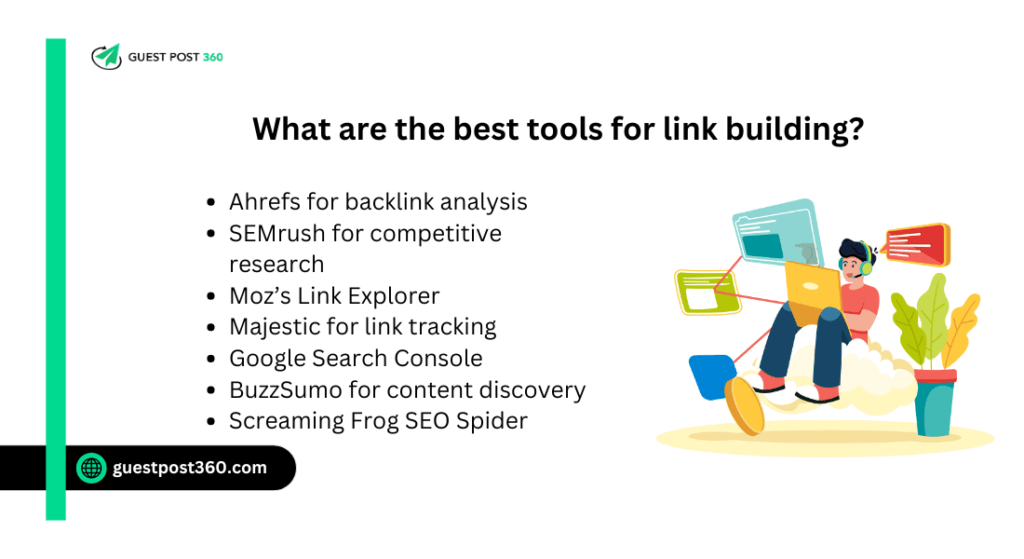

Another valuable tool is SEMrush, which offers a range of features for link building, including backlink audits, competitor analysis, and link building outreach. SEMrush helps you identify potential link sources, track your backlinks, and analyze your competitors’ link profiles to uncover new opportunities for your site.
Moz’s Link Explorer is another useful tool that provides insights into your backlink profile, including the quality and quantity of links. Moz offers metrics such as domain authority and page authority to help you assess the value of your backlinks and make informed decisions about your link building strategy.
Additionally, tools like Majestic and Google Search Console can provide valuable data for link building. Majestic offers detailed link analysis and historical data, while Google Search Console helps you monitor your backlinks and identify any issues that may affect your SEO performance. By leveraging these tools, you can effectively manage and optimize your link building efforts for better search engine results.
What are advanced techniques for effective link building?
Advanced link building techniques can help you achieve superior results by going beyond basic strategies to acquire high-quality backlinks. One technique is to focus on content promotion and amplification. Create in-depth, high-value content such as research reports, case studies, or comprehensive guides and promote it through various channels, including social media, email outreach, and industry forums. This approach increases the likelihood of earning backlinks from authoritative sources interested in your valuable content.
Another advanced technique is leveraging broken link building. Identify broken links on authoritative sites within your niche and offer your own content as a replacement. This method not only helps you secure high-quality backlinks but also assists webmasters in maintaining their site’s integrity by fixing broken links.
Additionally, consider engaging in influencer marketing to boost your link building efforts. Collaborate with industry influencers to create content or campaigns that include backlinks to your site. Influencers often have a large following and strong online presence, which can result in valuable backlinks and increased exposure for your content.
Finally, implement a skyscraper technique, where you identify popular content within your niche and create a superior version of it. Reach out to sites that linked to the original content and present your enhanced version as a better resource. This technique leverages existing interest and backlinks to attract new links to your improved content.
How do you find link building opportunities in your niche?
Finding link building opportunities within your niche involves a strategic approach to discovering websites and content that are relevant to your industry. Start by conducting competitor analysis to identify where your competitors are obtaining their backlinks. Use tools like Ahrefs, SEMrush, or Moz to analyze their link profiles and uncover potential sources that you can target for your own link building efforts.
Additionally, perform keyword research to find relevant industry topics and sites. By identifying keywords related to your niche, you can discover websites that are ranking for those terms and may be potential link sources. Explore content within these sites to determine if there are opportunities to contribute or collaborate.
Engage in industry-specific forums, communities, and social media groups to find link building opportunities. Participating in these spaces allows you to connect with other professionals and discover potential sites that might be interested in linking to your content. Building relationships within these communities can also lead to collaborative opportunities and backlinks.
Lastly, consider reaching out to niche-specific directories and resource lists. Many industries have directories or curated lists of valuable resources, and getting listed can provide both backlinks and increased visibility. Ensure that these directories are reputable and relevant to your niche to maximize the value of the backlinks you acquire.
Can influencer partnerships help with link building?
Influencer partnerships can significantly enhance your link building strategy by leveraging the reach and authority of industry influencers. Collaborating with influencers allows you to tap into their established audience and gain valuable backlinks from their websites or social media profiles. Influencers often have a strong online presence and credibility within their niche, which can lead to high-quality, authoritative backlinks.
One way to utilize influencer partnerships for link building is through content collaborations. Work with influencers to co-create content, such as blog posts, articles, or videos, that includes backlinks to your site. This not only provides a direct link but also introduces your content to a broader audience that follows the influencer. By aligning your content with influencers’ interests and expertise, you enhance its appeal and increase the chances of earning valuable backlinks.
Another approach is to engage influencers in product reviews or endorsements. Provide influencers with access to your products or services and encourage them to share their honest opinions with their audience. When influencers review or endorse your offerings, they often include backlinks to your site, which can boost your link profile and drive referral traffic.
Additionally, influencer partnerships can help you gain exposure in industry-related publications or blogs. Influencers often have relationships with editors and journalists, and their endorsements can lead to features or mentions in reputable sources. These placements provide high-quality backlinks and enhance your site’s authority and visibility.
In summary, influencer partnerships are a powerful tool for link building, offering opportunities to acquire high-quality backlinks, expand your reach, and improve your site’s authority. By collaborating with influencers and leveraging their influence, you can strengthen your link building strategy and achieve better SEO results.

